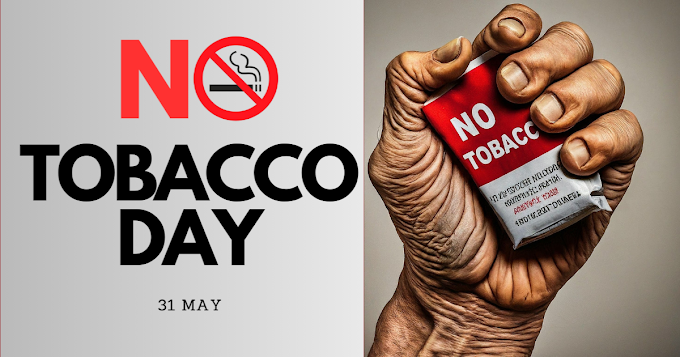The air we breathe sustains us. It's the invisible fuel that keeps our bodies running and our minds sharp. Yet, every year, millions around the world choose to pollute this vital resource with tobacco smoke. On 31 May Tobacco Day, a global campaign led by the World Health Organisation (WHO), we pause to recognise the devastating impact of tobacco use and advocate for a healthier future.
The Alarming Reality of Tobacco Use
Tobacco use is the single most preventable cause of death globally, claiming an estimated eight million lives each year. That's one person succumbing to a tobacco-related illness every three seconds. These statistics are a stark reminder of the urgency to raise awareness about the dangers of tobacco and encourage people to quit.
31 May Tobacco Day: A Call to Action
31 May Tobacco Day serves as a powerful platform for governments, public health organisations, and individuals to unite in the fight against tobacco. Each year, the WHO selects a specific theme to guide the campaign. Past themes have addressed the environmental impact of tobacco, the marketing tactics used by tobacco companies to target young people, and the link between tobacco use and non-communicable diseases.
This year's theme, for instance, could focus on empowering healthcare workers to support tobacco cessation efforts. Imagine a world where every doctor's appointment includes a conversation about quitting tobacco, with readily available resources and support systems to guide patients on their journey towards a smoke-free life. This is the kind of future 31 May Tobacco Day strives to create.
Beyond the Individual: The Ripple Effect of Tobacco Use
The consequences of tobacco use extend far beyond the individual smoker. Families bear the emotional and financial burden of caring for loved ones suffering from tobacco-related illnesses. Healthcare systems become strained, and productivity suffers as people grapple with the effects of tobacco use.
31 May Tobacco Day highlights the need for comprehensive tobacco control policies. This includes measures such as increasing tobacco taxes, banning tobacco advertising, and promoting smoke-free environments. By creating a social and economic disincentive for tobacco use, we can encourage people to make healthier choices and protect the health of entire communities.
The Power of Personal Stories on 31 May Tobacco Day
Statistics can paint a grim picture, but it's the personal stories that truly resonate. 31 May Tobacco Day provides a platform for individuals to share their experiences with tobacco use, both positive and negative. Hearing from cancer survivors who have successfully quit smoking, or from children who have lost a parent to tobacco-related illness, can be a powerful motivator for others to make a change.
Kicking the Habit: Resources for Quitting Tobacco
Quitting tobacco is no easy feat, but it's one of the most important decisions you can make for your health. The good thing is, you don't have to go it alone. On 31 May Tobacco Day and beyond, numerous resources and support systems are available to help you on your journey to becoming tobacco-free.
- Talk to your doctor: Your doctor can be a valuable resource, providing guidance and support as you develop a quit plan.
- Join a support group: Connecting with others who are trying to quit can provide much-needed encouragement and camaraderie.
- Consider nicotine replacement therapy: Nicotine replacement therapy can help manage withdrawal symptoms and make quitting easier.
- Explore online resources: There are numerous websites and apps dedicated to helping people quit tobacco.
Remember, quitting tobacco is an investment in your future health and well-being. The benefits are undeniable, from improved lung function and a reduced risk of cancer to increased energy levels and a better sense of taste and smell.
Taking Action Beyond 31 May Tobacco Day
31 May Tobacco Day serves as a powerful starting point, but the fight against tobacco use requires a year-round commitment. Here are some methods to continue making a difference:
- Educate yourself and others: Learn more about the dangers of tobacco use and share that information with friends, family, and colleagues.
- Advocate for change: Support policies that reduce tobacco consumption, such as increased taxes and smoke-free laws.
- Be a role model: Choose not to smoke around others, especially children, and encourage those around you to do the same.
- Support organisations working to end tobacco use: Donate your time or resources to organisations working to raise awareness about the dangers of tobacco and support tobacco cessation efforts.






